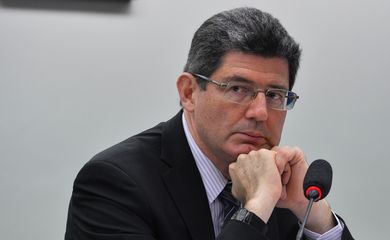Finance Minister says measures proposed do not take away people's rights

The measures proposed as part of the fiscal adjustment for the 2016 Federal Budget Plan will not take away the rights of the population, said Finance Minister Joaquim Levy Tuesday (Sep. 15). In an interview on NBR TV, he said the spending cuts and tax hikes aim to restore economic balance as smoothly as possible.


Finance Minister Joaquim Levy
According to Levy, the reductions are an attempt to preserve the government's main social programs and bring the economy back into balance “to overcome the current situation, recover growth, and generate more jobs. [The measures] were devised to enable the government to meet its objectives with no changes to people's rights, the minimum wage, or the social programs,” he declared.
Regarding the bill which restores the former CPMF tax (Temporary Contribution on Financial Transactions, in a literal English translation), the minister stressed the momentary nature of the levy, and insisted: “It's a tax that doesn't bring major problems to the economy—a tax everyone pays. It's temporary and designed for tackling a special situation. It's easy to collect and won't hit the inflation.”
Spending cuts
As for the slash in expenditures, the minister remarked that government spending showed no real growth this year, inflation considered. He said, however, that any move aimed at curbing spending is worthwhile, including the reduction in costs like cell phones used by officials in the Executive branch. “It's very little, but everything is important. There must be discipline. We're spending less and making cuts even in the government itself,” he noted.
Levy restated that the main challenges facing the Brazilian economy have been posed by the international crisis, which has made a significant impact on emerging countries, like Brazil.
Nonetheless, he went on to say that the country's economy has already started showing signs of recovery, like the increase in exports and the performance in agriculture, with record-breaking crops. “The last time exports had made a liquid contribution to growth was ten years ago. That's good for the industry, because it helps create jobs,” he concluded.
The role of Congress
Levy urged the National Congress to take responsibility for the fiscal adjustment and said that the congresspeople must contribute to bringing Brazil back on track.
“The government is listening to the Senate, the Chamber [of Deputies], and all of those who eventually will have to vote. The government implemented measures for putting Brazil on the growth track, but they can only become law if voted by the two houses. The Congress plays a key role in Brazil's attempt at recovering growth, and 2016 will be a year with low inflation and more significant growth,” the minister argued.
Levy tried to play down the impact of the political crisis on economic activity, but admitted that shaken ties between the Executive branch and Congress have hindered the country's recovery.
“Amid normal circumstances, if discussions weren't so bitter concerning certain things, we'd be starting to sense a recovery in stronger terms.”
The minister reiterated that the government has already started curbing spending, with cuts amounting to $5.18 billion this year alone. He recognized that one of the harshest strategies adopted was postponing the pay adjustment of civil servants. He said, however, that the current economic landscape demands the engagement of all segments of society.
The Minha Casa, Minha Vida affordable housing program
To prove social programs are not being set aside, Levy mentioned the record-breaking performance of the Plano Safra agricultural plan this year. He stated that, despite the $1.24 billion cut in the government's Minha Casa, Minha Vida housing initiative, the previously arranged construction of units will be preserved.
“The budget for 2016 includes $2.85 billion of [the government's] own funding, plus $1 billion from the FGTS [Guarantee Fund for Length of Service, in a rough English translation] earmarked for construction under Minha Casa, Minha Vida. Investment in popular housing was never so high, despite all the crisis and the economic challenges,” Levy said.
The minister further said that the government is maintaining the initiative because it understands its role in several regions, like the Northeast. “The budget sought to maintain the program not only because having a home is important, but also because construction is among the sectors which most generate employment. The government is laying money aside to resume the construction of all houses in the contract. We've got more than 2.75 million houses completed, and at least 1 million to be concluded,” he added.
Translated by Fabrício Ferreira
Fonte: Finance Minister says measures proposed do not take away people's rights



